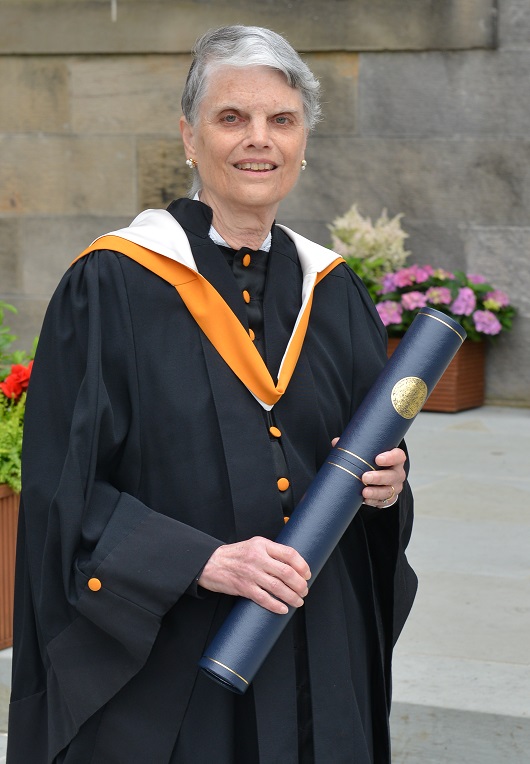Laureation address: Dr Alice-Mary Talbot

Laureation by Dr Tim Greenwood
School of History
Chancellor, it is my privilege to present Dr Alice-Mary Talbot for the degree of Doctor of Letters, honoris causa.
Alice-Mary Talbot is one of the world’s foremost scholars of Byzantium, the Roman Empire in the eastern Mediterranean which endured for almost a thousand years after its eclipse in the west, until the fall of its capital, Constantinople, to the Ottoman sultan in 1453, forty years after the foundation of this University. Her contribution to the study of middle and late Byzantine social and religious history in general, and women and religious culture in Byzantium in particular, has been immense; even in retirement she has continued to make Byzantine literature available in English translation through the Dumbarton Oaks Medieval Library. But her contribution to the discipline and to academia goes beyond her published and edited works. Alice-Mary Talbot has had a transformative impact in two other ways. For she is one of the generation of pioneering female scholars in the United States who broke through the glass ceiling back in the 1970s and transformed academic life and culture as a result. Moreover, Alice-Mary Talbot is famous for her generous encouragement of the research of younger scholars. Let me say a few words about her contribution in these three areas of scholarly activity.
Alice-Mary Talbot is Director Emerita of Byzantine Studies at Dumbarton Oaks, a prestigious research institute of Harvard University in Washington DC. After a first degree at Radcliffe College in Cambridge, Massachusetts, and a doctorate in Byzantine and Ottoman History from Columbia University in New York, Alice-Mary Talbot taught at several colleges in Ohio before moving to Dumbarton Oaks in 1978, where she held several positions, including that of Director of Byzantine Studies between 1997 and 2009. Among her accomplishments at Dumbarton Oaks was her service as Executive Editor of the Oxford Dictionary of Byzantium, published in three volumes in 1991. In addition to these responsibilities, Alice-Mary has served on numerous editorial boards, committees of professional associations and learned societies. In 2011/12 she was President of the Medieval Academy of America, a notable expression of the esteem in which she is held by her fellow medievalists in the United States.
Her published research has focused on religious life and culture, including the cult of saints, lay piety and monasticism. It is characterised by meticulous reading of the textual evidence, founded upon her exceptional command of the many registers of Byzantine Greek, equally at home when translating the rhetorical letters of an early fourteenth-century patriarch, or miracle collections written expressly in a language accessible to the common people. Alice-Mary Talbot is one of the few honorary graduands for whom the University’s Greek motto holds no mystery. Her interest in the social context of religious practices has allowed her to uncover, translate and elucidate a remarkable body of little-studied material. Through individual studies and electronic publications and databases, Dr Talbot has introduced and then disseminated those texts, thereby opening up wider discourses on the medieval world to Byzantine comparison. And these are available instantly. If you have managed to smuggle your mobile phone into here, on silent mode, try searching under Holy Women and Talbot before the end of this ceremony and see what comes up. The inner worlds of Byzantine spirituality and devotion have increasingly come into view as a result of her incisive research, which has sometimes been conducted alone and sometimes in partnership with others. In a field where collaboration is rare, Alice-Mary Talbot has again proved the exception.
Finally Alice-Mary Talbot’s promotion of the interests of others cannot go unnoticed. She was the co-convenor of the first Byzantine Studies Association conference in the US in 1975, which was designed to attract and encourage the participation of younger scholars rather than senior staff. This has run every year since and has had a decisive impact on the academic careers of many scholars. About the same time, she was invited by her university to develop a course on women in antiquity and the medieval period. Again this was pioneering. Alice-Mary Talbot has been notable in her career for an unwavering commitment to the inclusion of women, both as worthy subjects in the study of Byzantine history and as valued colleagues and scholars. And while Director of Byzantine Studies Dumbarton Oaks, she was central to the decision to set up summer programmes in Byzantine Greek and a range of auxiliary disciplines – palaeography, sigillography and numismatics – for graduate students, opening up this august institution to the next generation.
In a career spanning more than fifty years, she has profoundly transformed the study of religious culture in the world of Byzantium, both through her own scholarly output and her selfless support of others.
Chancellor, in recognition of her major contributions to Byzantine history and literature, I invite you to confer on Dr Alice-Mary Talbot the degree of Doctor of Letters, honoris causa.
Category Awards